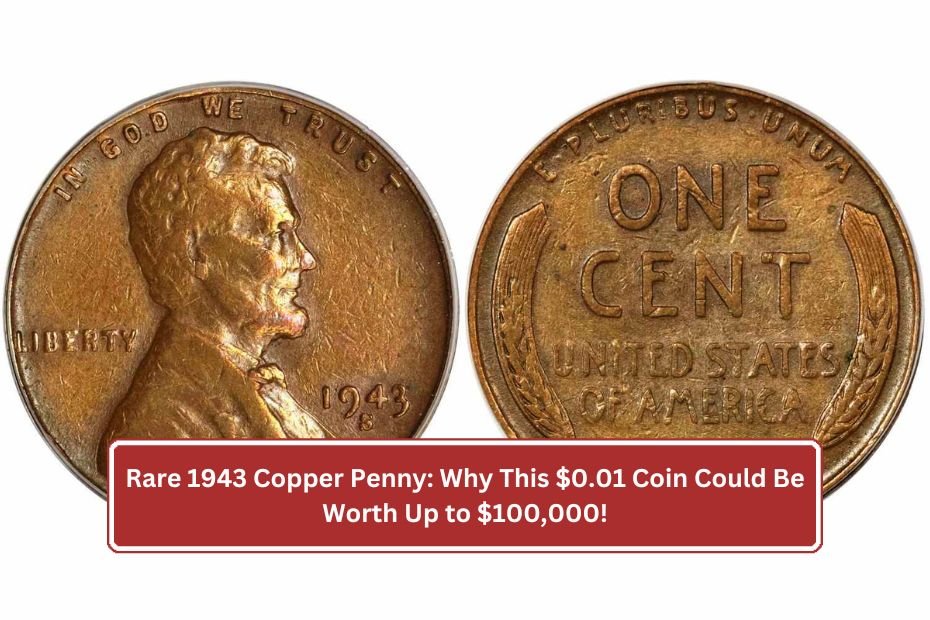Have you ever dreamed of finding a rare coin that could be worth a lot of money? It might sound unbelievable, but it’s true! Some coins, like the 1943 Lincoln Wheat penny, can be worth tens of thousands of dollars, or even more. This particular penny is special because a few were made using the wrong materials. In this article, we will explore why certain pennies are so valuable, how to identify them, and what makes these coins treasures for collectors.
Why the 1943 Copper Penny Is So Valuable
The 1943 Copper Penny is one of the most famous rare coins. During World War II, the U.S. Mint stopped making pennies from copper because the metal was needed for the war. Instead, they switched to steel pennies coated with zinc. However, some copper planchets accidentally remained in the machines, resulting in a few copper pennies being minted in 1943. This mistake makes them very rare and desirable.
Pennies with a mint mark from Philadelphia, Denver, or San Francisco are particularly sought after. In excellent condition, these coins can sell for over $50,000, and at auctions, some have even gone for more than $100,000!
Other High-Value Pennies with Unique Mint Marks
Aside from the 1943 penny, there are other valuable pennies with unique features. The 1944 Steel Penny is another notable error. After returning to copper production, a few steel blanks were mistakenly used, leading to a rare group of 1944 steel pennies. Just like the 1943 pennies, these are also valuable and can be worth between $75,000 and $100,000 when in mint condition.
Here are some other notable pennies you should look out for:
| Coin | Mint Mark | Estimated Value |
|---|---|---|
| 1943 Copper Penny | Any | $50,000 – $100,000+ |
| 1944 Steel Penny | Any | $75,000 – $100,000+ |
| 1955 Doubled Die Lincoln | Philadelphia | $5,000 – $20,000+ |
| 1922 No D Lincoln | Denver | $12,000 – $30,000 |
| 1959-D Wheat Penny Mule | Denver | $50,000 |
Identifying Rare Pennies in Your Collection
If you think you might have a valuable penny, here are some tips to help you identify it:
- Check the Mint Mark and Date: Look for pennies with the year 1943 that are copper-colored. If you find one, it could be very valuable! Also, check for 1944 pennies that are steel.
- Look for Doubling Errors: Some valuable pennies have doubling on their dates or letters. For example, the 1955 Doubled Die Lincoln penny has noticeable doubling, which significantly increases its value.
- Assess Condition: The condition of a coin can greatly affect its value. Coins in better shape (like those graded as AU or uncirculated) are worth more than heavily worn coins.
- Consult with a Professional: If you think you’ve found a rare coin, it’s smart to get it checked by a professional grading service like PCGS or NGC. They can confirm if it’s authentic and tell you how much it’s worth.
Conclusion
Finding a rare coin, like the 1943 copper penny or the 1944 steel penny, can be an exciting experience. Knowing what to look for can help you uncover valuable treasures hiding in your collection. Remember, the mint mark and the condition of the penny are essential when determining its value. Whether you’re just starting out or are a serious collector, understanding these unique coins can make your hobby even more rewarding. Keep an eye out for these rare pennies, as they could be worth a lot more than you think!
FAQ’s
What makes the 1943 copper penny so valuable?
The 1943 copper penny is valuable because it was accidentally struck on copper planchets instead of the intended steel. This rare minting error makes it highly sought after by collectors, with some coins selling for over $100,000.
How can I identify a rare penny in my collection?
To identify a rare penny, check the date and mint mark. Look for copper-colored pennies from 1943 or steel pennies from 1944. Additionally, look for doubling errors in the lettering, especially on the 1955 Lincoln penny, and assess the coin’s condition.
Should I get my rare coin professionally graded?
Yes, if you suspect you have a rare coin, it’s a good idea to have it graded by a reputable service like PCGS or NGC. Professional grading can confirm the coin’s authenticity and provide an accurate assessment of its value

